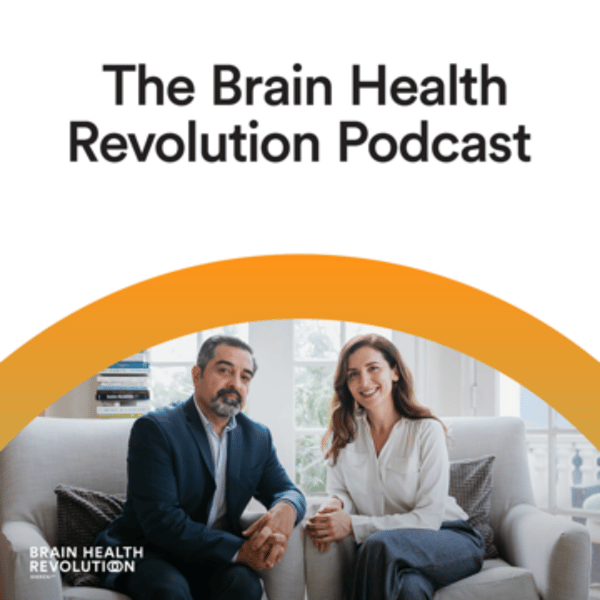Alzheimer’s genetics, Omega-3s and Brain Health - Dr. Hussein Yassine, MD
The Brain Health Revolution Podcast
Dean and Ayesha Sherzai
4.8 • 604 Ratings
🗓️ 5 August 2022
⏱️ 56 minutes
🧾️ Download transcript
Summary
In this episode, we sat down with Dr. Hussein Yassine, Associate Professor of Medicine at Keck School of Medicine of USC.
He is the director of the Yassine lab (www.yassinelab.com) and specializes in how changes in lipid metabolism and nutrition affect cognition and the risk of developing Alzheimer's disease (AD). The lab has an interest in studying how carrying the APOE4 allele, strongest genetic risk factors for developing AD, affects lipid metabolism, the response to the diet; combining basic science, clinical trials and brain imaging studies.
We discussed brain physiology and development, lipid metabolism in the brain, genetics, especially ApoE4 genotype and risk of AD, and his research on omega-3 fatty acids and prevention of cognitive decline. We hope you find the information helpful.
We invite you to check out the NEURO Academy online community, a membership based environment outside of social media where you will have access to multiple on demand courses and engage with a thriving and supportive community of people on a journey towards better brain health. You will be connected with us as well as a team of moderators who will guide you. You will have access to live Q&A sessions, Live cooking sessions, ongoing on demand courses on lifestyle, nutrition and cooking, NEURO coaching, anxiety, and many courses on various topics related to brain health. NEUROacademy.com
Follow us on social media:
Instagram: The Brain Docs @thebraindocs
Facebook: The Brain Docs
Website: TheBrainDocs.com
Transcript
Click on a timestamp to play from that location
| 0:00.0 | Welcome to the Brain Health Revolution podcast with your hosts, Aisha and Dean Sharesai. |
| 0:10.6 | In this episode, we sat down with Dr. Hussein Yassine, who is an associate professor in the |
| 0:16.5 | Department of Medicine, Keck School of Medicine of the University of Southern California. |
| 0:22.0 | He directs the Yassine Lab, which specializes in how changes in lipid metabolism and |
| 0:28.2 | nutrition affect cognition and the risk of developing Alzheimer's disease. |
| 0:33.2 | The lab has an interest in studying how carrying the APOE4 allele, the strongest genetic risk |
| 0:40.3 | factor for developing Alzheimer's disease, affects lipid metabolism, the response to diet, |
| 0:46.3 | combining basic science, clinical trials, and brain imaging studies. |
| 0:51.3 | He directs the Roybal Alzheimer's disease research program focused on understanding |
| 0:55.8 | how obesity, diabetes, and vascular risk factors in Los Angeles Latin X population affect cognition |
| 1:03.6 | and Alzheimer's disease risk using longitudinal studies with cerebrospinal fluid and brain imaging |
| 1:09.9 | biomarkers. |
| 1:15.6 | He also runs the lipid clinic at the healthcare centers in East Los Angeles, |
| 1:21.4 | providing care for a large population of complex lipid and diabetes disorders that are referred from all over the Los Angeles County clinics. |
| 1:25.1 | It was an amazing conversation, and we hope you enjoy it as |
| 1:28.7 | much as we did. Thank you for joining us today. Well, Dr. Yassin, it's so wonderful to have you |
| 1:35.1 | here with us. Thank you so much for joining us. Of course, my pleasure. And thank you both Dean and |
| 1:41.2 | Ayesha for this invitation. Wonderful. We're both, as you know, neurologists and we do research. |
| 1:47.0 | I was the director of research education for Loma Linda for many years. |
| 1:51.6 | And then at Cedar Sinai, we were both the co-directors of brain health in Cedar Sinai. |
| 1:56.4 | And then back in Loma Linda as the directors of brain health and Alzheimer's prevention program. |
| 2:03.2 | But our singular focus has been on prevention and lifestyle. |
... |
Please login to see the full transcript.
Disclaimer: The podcast and artwork embedded on this page are from Dean and Ayesha Sherzai, and are the property of its owner and not affiliated with or endorsed by Tapesearch.
Generated transcripts are the property of Dean and Ayesha Sherzai and are distributed freely under the Fair Use doctrine. Transcripts generated by Tapesearch are not guaranteed to be accurate.
Copyright © Tapesearch 2025.

